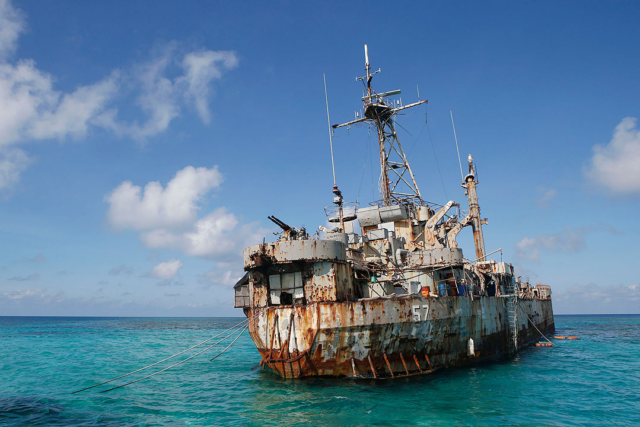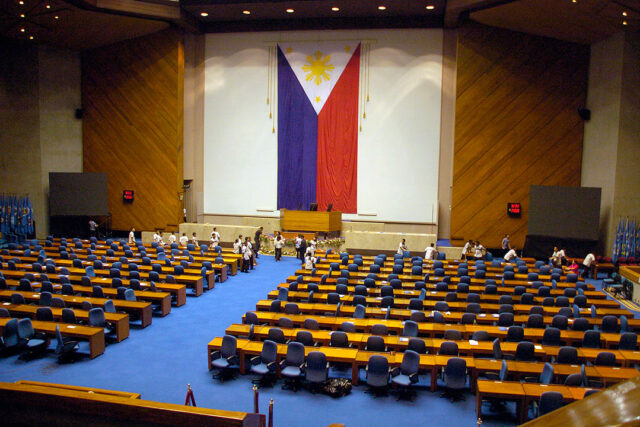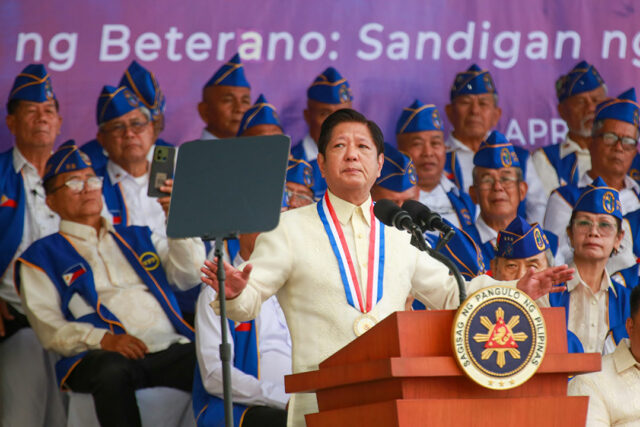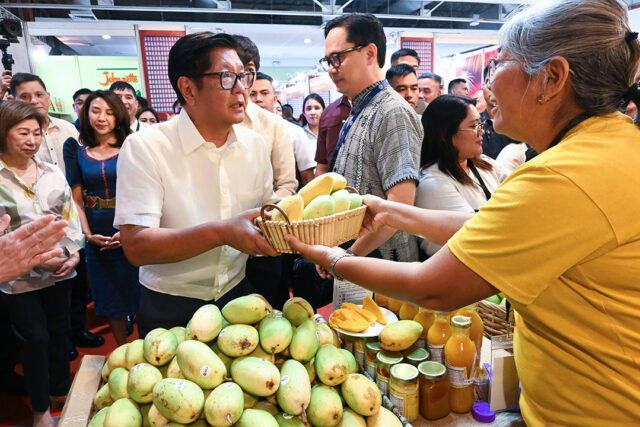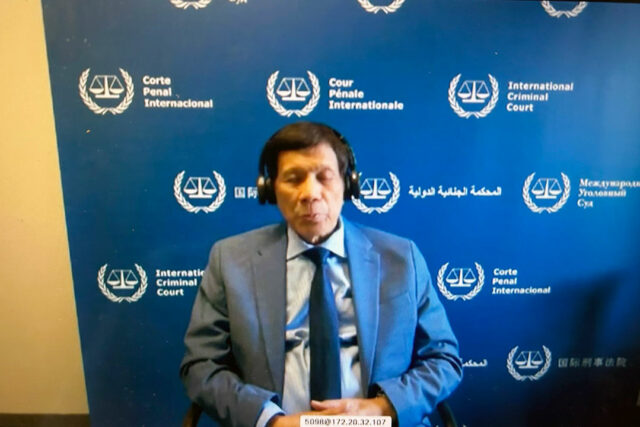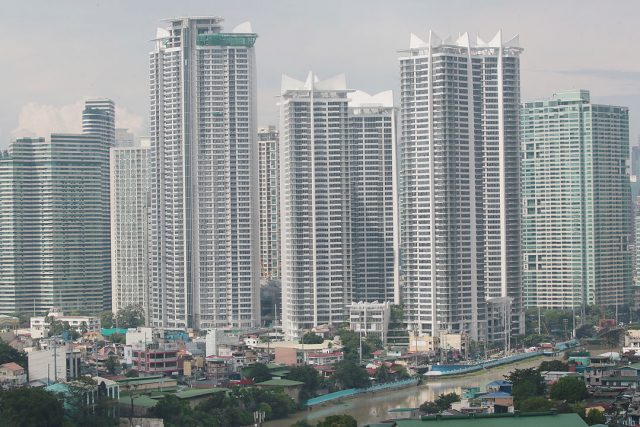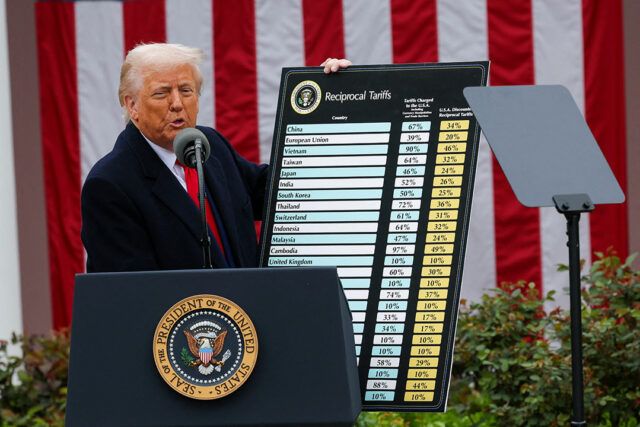By Aubrey Rose A. Inosante, Reporter
THE GOVERNMENT has been slow in responding to the tariffs imposed by US President Donald J. Trump, an academic said, adding that the Philippines needs to support Washington’s reordering of the global trading system while positioning itself as a hub enjoying favored access to US markets.
University of Asia and the Pacific Institute of Law Dean Jemy Gatdula described the government’s response to the tariff increase as “tentative” and “slow.”
“We should have early on declared support for Trump’s restructuring of the global security and trade system,” Mr. Gatdula told BusinessWorld via Facebook Message. “We should have immediately explored ways to lower our tariffs vis-a-vis the US, positioning us as a low-tariff trade hub (with) greater access to US communication, blockchain, finance, shipbuilding, and energy investment and technology.”
Nine days after Mr. Trump’s so-called “Liberation Day” imposing at least 10% tariffs on all its trading partners, the Philippines has yet to announce a concrete plan to counter the 17% tariff imposed by the US.
Trade Secretary Ma. Cristina A. Roque said on April 7 that her department is “definitely” open to lowering tariffs on US goods, adding that she will meet soon with the economic team to discuss the matter.
Palace Spokesperson Clarissa A. Castro said only that the matter is currently being studied.
“We should maximize our US Global System of Preferences access, as well as reviving the possibility of an FTA, improving our competitiveness and productivity, while increasing tariffs on China and correcting our $23-billion trade deficit with China,” Mr. Gatdula said.
In an e-mail, HSBC economist for the Association of Southeast Asian Nation (ASEAN) Aris D. Dacanay said the Philippines can promote a China +1 strategy, referring to the approach taken by some manufacturers to relocate some operations to “friendlier” countries.
“While negotiating for even lower tariffs, a trade delegation can be sent to aggressively woo foreign manufacturers and multinationals selling to the US to relocate to the Philippines, to potentially build and reconfigure the country’s manufacturing sector,” Mr. Dacanay said.
The Philippines exported $12.14 billion worth of commodities to the US in 2024. Of the total, 53% or $6.43 billion were electronic products.
He also proposed that the Philippines buy more US agricultural goods.
Minimal Government Thinkers, Inc. President Bienvenido S. Oplas, Jr. said the government should pursue variety of measures, calling the response so far as insufficient.
“I think the Philippines should put on the table the possibility of zero tariffs with US. So far Vietnam and Taiwan have offered this to the US. Not for all products but for priority products like liquefied natural gas, cars, other manufactured goods,” he said.
Vietnam Deputy Prime Ministers Bui Thanh Son on April 7 offered to remove all US import tariffs and requested a postponement of tariffs by at least 45 days.
This was struck rejected by Mr. Trump’s trade adviser Peter Navarro.
Jose Enrique A. Africa, executive director at think tank IBON Foundation, has characterized the government’s inaction as caving in to US bullying while holding on to “misguided free market dogma that lower tariffs are always better.”
“The best response for the government to take has to start from finally realizing that the era of export- and Foreign Direct Investment-led investment started winding down in 2008/2009 and it is urgent to shift to domestic-led and -oriented development,” he said.
Some ASEAN countries have started to formulate a joint approach to negotiating, as the region with some of the highest tariffs.
Cambodia was hit with a 49% tariff, followed by Laos (48%), Vietnam (46%), Myanmar (44%), Thailand (36%), Indonesia (32%), Malaysia (24%), and Brunei (24%).
Indonesian President Prabowo Subianto reportedly called Malaysian Prime Minister Anwar Ibrahim, Brunei Sultan Hassanal Bolkiah, President Ferdinand R. Marcos, Jr., and Singapore Prime Minister Lawrence Wong to discuss the region’s tariffs.
On April 4, Cambodian Prime Minister Hun Manet wrote US President Donald J. Trump, committing to a 5% tariff for US goods in 19 product categories.
Thai Deputy Prime Minister Pichai Chunhavajira and Indonesia Chief Economic Minister Airlangga Hartarto are heading to the Washington in hopes of securing a deal for their countries.
Aside from also dispatching a delegation to the Washington for tariff talks, Malaysia has lobbied for a united ASEAN response to the US, according to Prime Minister Anwar Ibrahim.
The United Nations Economic and Social Commission for Asia and the Pacific (ESCAP) Macroeconomic Policy and Analysis Section Chief Vatcharin Sirimaneetham said the Philippines’ economic growth is tied to the reaction of its exporters to tariff changes, finding new markets and adjusting prices.
“This is what other countries around the world are also doing, so competition is especially high,” he said.
He said the eventual US tariff on the Philippines after negotiations will be closely watched, as well as the exemptions for categories of goods and the impact on regional supply chains in Asia.
In its Economic and Social Survey of Asia and the Pacific 2025 report, the Philippine economy was projected by ESCAP to expand by 6.1% this year, unchanged from its forecast issued a year earlier. The report had been prepared before the US tariffs were announced.
“It is challenging to comment on the projected economic growth in 2025 now because the underlying information and assumptions are still evolving daily, with a usually high degree of uncertainty,” he said.
For 2026, the Philippines is expected to grow 6.3%, ESCAP said.
Both of these projections were within the Development Budget Coordination Committee’s 6-8% GDP growth until 2028.


